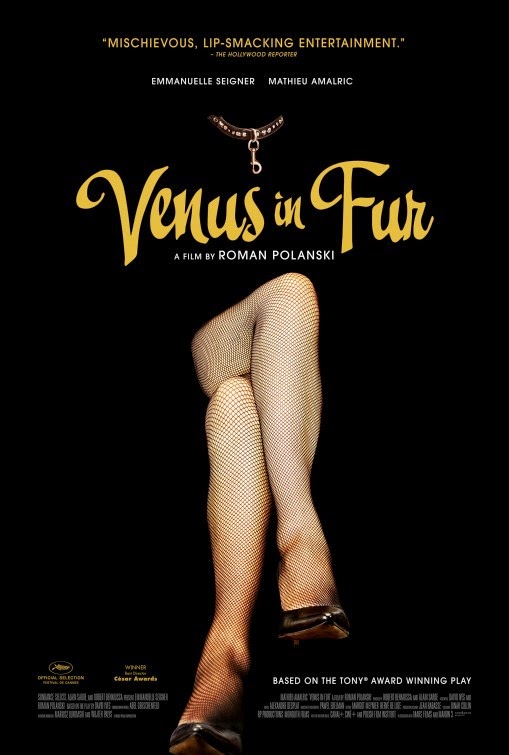Gender Games: "Venus in Fur" works as wickedly playful on-screen theater
Venus in Fur (2014)
96 min., not rated (equivalent to an R).
Director Roman Polanski gives translating stage play to screen another go after 2011's "Carnage." Despite the varying success of airing out contrivance from its setup of holding four prideful characters in one bourgeois Brooklyn apartment, the auteur was more than able to use talky, toothy material to get excellently unshackled performances out of his high-caliber actors and make the one location quite constricting and palpably claustrophobic. With "Venus in Fur," a real-time two-hander from David Ives' play that first opened off-Broadway in 2010 and then took to The Great White Way, Polanski has an easier time making a power struggle transpiring in an empty theater (mostly on-stage) more believable at the start, but he still has his work cut out for him in executing a film—not just a play on film—and keeping every word and movement enthralling. Luckily, his two commanding actors are more than willing to take control and tear into Polanski's juicy, daring French translation with wit, electric kink, and a wicked playfulness.
Playwright and theater director Thomas Novacheck (Mathieu Amalric) is about to call it a night after a hopeless day of abysmal casting auditions for his adaptation of Leopold von Sacher-Masoch's 1870 masochism-inspiring novel "Venus in Furs" in a rickety Parisian theater. Then, during a heavy storm, a drenched, bedraggled, gum-chewing woman (Emmanuelle Seigner) with a trampy dog collar and tattoo comes knocking, apologizing for being so late but pleading to audition. She says her name is Vanda, the same name as the character she's auditioning to play, but Thomas can't find her on his call schedule and deems her all wrong for the part. Vanda persists to be given a chance, stripping down to her S&M gear but also bringing along a more period-appropriate frock, and even adjusts the lighting before she takes the stage and Thomas reads and goes through the blocking with her. Once Vanda seems to know the text by heart and be able to slip in and out of character, she soon proves to her director that she isn't as scatterbrained as she first let on but could be the goddess he was seeking all this time. That's where Thomas' role-playing reality and his play about man's enslavement to a woman become blurred and inextricable.
A bitingly verbose, impeccably performed and assuredly crafted French battle-of-the-sexes dark comedy and chamber piece, "Venus in Fur" doesn't merely amount to a lot of blabbing and screeching. Through the lips of these slippery characters, the film has a lot to say about creation and criticism (perhaps Polanski's reponse to his own critics), sexism, subjugation and submission. As the play and reality become muddled, the power shifts from Thomas to Vanda, and one can just feel Polanski in the walls. There's a personal touch to "Venus in Fur," not the least of which comes from the casting of the director's 47-year-old missus (this being their fourth pairing) and a dead ringer for himself forty years ago, but also in thematic hints of his previous works. Emmanuelle Seigner is terrific, deliciously navigating her way between vulgar bimbo, tortured actress, and cagey, caustic dominatrix. Vanda continues to confuse the word "ambiguity" with "ambivalence" and judge the point of Thomas' adapted play by reductively calling it S&M porn. Whether she's making a clueless look, seducing her screen/stage partner, or humiliating him, she's a thrill to watch as "Vanda." Mathieu Amalric, a spitting image of a younger Polanski, is equally good opposite his "The Diving Bell and the Butterfly" co-star as Thomas Novacheck, initially in charge and then still keeping up.
Opening and closing with Alexandre Desplat's jaunty, mischievous score as Pawel Edelman's fluidly roving camera dollies through the stormy streets of Paris and pushes through the theater doors, "Venus in Fur" might have come off stagy in different hands. Though it never leaves the single space or its two characters, the film feels tight but cinematic, with more breathing room than "Carnage." It keeps moving and remains unpredictable, at least before the telegraphed sight of a phallic cactus (a prop from a previous stage performance of "Stagecoach"). Before the film's final moments that might not be able to be taken seriously (or maybe it's supposed to be pitched to a level of over-the-top hysteria), the verbal volleying is tense, literate, and funny. With so many films accused of being misogynistic, "Venus in Fur" is intentionally misandristic and does it with perverse pleasure.
Grade: B











Comments
Post a Comment